Stadio Olimpico
The Stadio Olimpico is the main and largest sports facility of Rome, Italy. It is located within the Foro Italico sports complex, north of the city. The structure is owned by the Italian National Olympic Committee and it is used primarily for association football. The Stadio Olimpico is the home stadium of Roma and Lazio and also hosts the Coppa Italia final. It was rebuilt for the 1990 FIFA World Cup and it hosted the tournament final.
Olimpico | |
UEFA | |
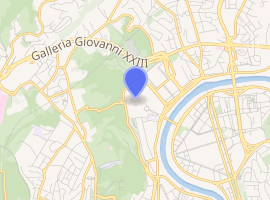
| |
| Location | Viale dei Gladiatori, 00135 Rome, Italy |
|---|---|
| Coordinates | 41°56′1.99″N 12°27′17.23″E |
| Owner | Italian National Olympic Committee |
| Operator | Sport e Salute |
| Capacity | 70,634[1] |
| Surface | Grass 105 × 66 m |
| Construction | |
| Broke ground | 1901 |
| Built | 1927 |
| Opened | 1932 (partial opening), 1953 |
| Expanded | 1990 |
| Architect |
|
| Tenants | |
| A.S. Roma (1953–present) S.S. Lazio (1953–present) Italy national football team (selected matches) Italy national rugby union team (2012–present) | |
Rated an UEFA category four stadium, it has also hosted four European Cup finals, the most recent being the 2009 UEFA Champions League Final. Outside football, the stadium is used by the Italian national rugby union team and it is Italy's national athletics stadium. Occasionally, it hosts concerts and events.
History
Throughout its history, the Stadio Olimpico has undergone several renovations.
1937, the Stadio dei Cipressi
In its first stages, the Stadio Olimpico was called the Stadio dei Cipressi. It was designed and constructed within the larger project of the Foro Mussolini (Mussolini Forum) which was renamed Foro Italico after the war.
Construction work began in 1927 directed by the Turinese engineer Angelo Frisa and architect Enrico Del Debbio. The construction was completed in 1932, after a few variations to the original plan. For instance, the construction of masonry stands was not part of the initial plan as, originally, stands consisted of grassed terraces.
In 1937, the construction of a second tier of stairs was started but was interrupted in 1940 due to the outbreak of World War II.
1953, the Stadio dei Centomila
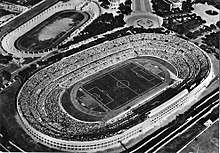
In December 1950, the working site was reopened for the completion of the stadium. The project was entrusted to the engineer Carlo Roccatelli, a member of the Superior Council of Public Works. At first, the plan was for a stadium with a more complex structure than that actually realised. However, the scarcity of funds and the environmental characteristics of the area led to a less ambitious building. On the death of Roccatelli in 1951, the direction of the work was entrusted to architect Annibale Vitellozzi. The stadium now reached a capacity of about 100,000 people, hence the stadium was known as Stadio dei Centomila, until renamed for the 1960 Olympics. The building was inaugurated on 17 May 1953 with a football game between Italy and Hungary.
1960, the Stadio Olimpico
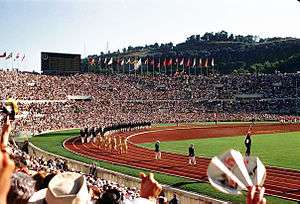
During the 1960 Summer Olympics, the stadium hosted the opening and closing ceremonies and the athletics competitions. Seating at ground level was eliminated with the result of an actual capacity of 65,000 spectators.[3] Subsequently, the stadium hosted several editions of the Italian Championships of Athletics, the 1975 Summer Universiade (the stadium was the only venue for the Universiade) and the 1987 World Athletics Championships. It still hosts the annual meeting of the Golden Gala.
1990 restructuring and roofing of the stadium
.jpg)
For the 1990 FIFA World Cup, for which it was the main stadium, the facility underwent an extensive renovation. While that work was underway in 1989 the Capitoline teams Lazio and Roma had to play their Serie A games at Stadio Flaminio. The work was entrusted to a team of designers including the original architect Annibale Vitellozzi. From 1987 to 1990, the construction plan was amended several times, with a consequent rise in costs. Ultimately, the Olimpico was entirely demolished and rebuilt in reinforced concrete, with the exception of the Tribuna Tevere which was expanded with the addition of further steps and of the curves which were closer to the field by nine metres. All sectors of the stadium were provided with full coverage in tensostructure white. Backless seats in blue plastic were installed and two giant screens built in 1987 for the World Athletics Championships were also mounted inside the curve. In the end the new version of the Olimpico had 82,911 seats. It was the 14th stadium in the world for number of seats among the football stadiums, the 29th among all stadiums and the second in Italy, just behind the San Siro Stadium of Milan.
The Stadio Olimpico was host to five matches in which the Italian national team took part and the final between West Germany and Argentina. West Germany won the final match 1–0.
With the same layout from 1990, the Stadio Olimpico hosted on 22 May 1996 the UEFA Champions League Final between Juventus and Ajax which saw the Bianconeri prevail in a penalty shoot-out.
2008 restyling of the stadium
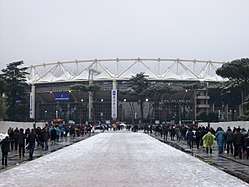
.jpg)
In 2007, a vast plan of restyling the internal design of the stadium was laid out, to conform to UEFA standards for the 2009 UEFA Champions League Final which was held in Rome. The work was performed and completed in 2008. It included the establishment of standard structures with improvements in security, the fixing of dressing rooms and of the press room. It also included the replacement of all seats, the installation of high definition LED screens, the partial removal of plexiglas fences between spectators and the field and a reduction of seating to the current capacity of 70,634. In order to enhance the comfort of the audience, part of the modernisation of the stadium involved increasing the number of restrooms and fixing the toilets. As a result of these improvements, the Stadio Olimpico was classified a UEFA Elite stadium.
Areas and capacity
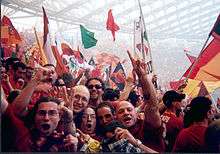
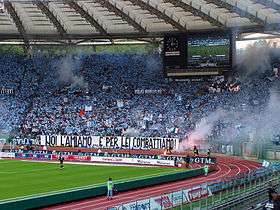
The stadium has a current capacity of 72,698, distributed as follows:[4]
- Tribuna Monte Mario – 16,555
- Tribuna Tevere – 16,397
- Distinti Sud Ovest – 5,747
- Distinti Sud Est – 5,637
- Distinti Nord Ovest – 5,769
- Distinti Nord Est – 5,597
- Curva Sud – 8,486
- Curva Nord – 8,520
- For end stage concerts/shows it can hold up to 75,000.
- For center stage concerts/shows it can hold up to 78,000.
Competitions hosted
- 1960 Summer Olympics
- 1974 European Athletics Championships
- 1975 Summer Universiade
- 1977 European Cup Final
- UEFA Euro 1980
- 1984 European Cup Final
- 1987 World Championships in Athletics
- 1990 FIFA World Cup
- 1996 UEFA Champions League Final
- 2001 Summer Deaflympics
- 2009 UEFA Champions League Final
- UEFA Euro 2020
- Central Countryside Club Championship Final 2020
Famous matches
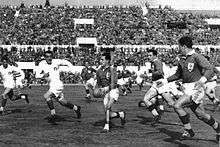
- The 1968 European Championship final match saw Italy win against Yugoslavia 2–0.
- The 1973 Intercontinental Cup match saw Independiente win the trophy against Juventus 1-0
- The 1977 European Cup Final match saw Liverpool win the trophy against Borussia Mönchengladbach 3–1.
- The 1980 European Championship final match saw Germany win against Belgium 2–1.
- The 1984 European Cup Final match saw Liverpool win the trophy after a penalty shootout against native team Roma (regular time ended 1–1).
- The 1990 FIFA World Cup Final match saw West Germany win against Argentina 1–0.
- The 1996 UEFA Champions League Final saw Juventus win the trophy after a penalty shootout against Ajax (regular time ended 1–1).
- The 2009 UEFA Champions League Final saw Barcelona win against Manchester United 2–0.
- The 2013 Six Nations Championship saw the Italian rugby team beat France for only the second time in the championship and the first time at this stadium.
- The 2013 Six Nations Championship saw the Italian rugby team beat Ireland for the first time ever in the championship.
Average attendances
The average season attendance at league matches held at the Stadio Olimpico for Lazio and Roma. [5]
|
|
|
# In 1989–90 season both teams played at Stadio Flaminio during the renovations of Stadio Olimpico.
* Club was in Serie B
![]()
![]()
1990 FIFA World Cup
The stadium was one of the venues of the 1990 FIFA World Cup, and held six matches. The first five involved host nations Italy. All their Group A matches (1–0 wins over Austria 9 June and United States on 14 June respectively and a 2–0 win over Czechoslovakia on 19 June), their Round of 16 match against Uruguay on 26 June winning 2–0 and their Quarter-finals against Republic of Ireland on 30 June winning 1–0. The sixth was the Final where West Germany and Argentina on 8 July with West Germany winning 1–0.
Concerts
| Date | Performer(s) | Opening act(s) | Tour/Event | Notes |
|---|---|---|---|---|
| 23 July 1991 | Miles Davis | Pat Metheny Group | ||
| 8 July 1992 | Elton John | The One Tour | ||
| 16 June 1993 | Zucchero | L'urlo Tour 1992/1993 | ||
| 9 July 1993 | Pino Daniele | |||
| 28 July 1993 | Litfiba | Terremoto Tour | ||
| 16 June 1994 | Pino Daniele Eros Ramazzotti Jovanotti |
|||
| 22 September 1995 | Pino Daniele | Non Calpestare i Fiori nel Deserto Tour | ||
| 4 October 1995 | Renato Zero | |||
| 8 June 1996 | Ligabue | Buon Compleanno Elvis! Tour | ||
| 27 June 1996 | Vasco Rossi | Nessun Pericolo per Te Tour | ||
| 5 July 1996 | Santana | Phish | 1996 Tour | |
| 7 July 1996 | Tina Turner | Wildest Dreams Tour | ||
| 9 July 1996 | Various artists | Live Link Festival | ||
| 10 July 1996 | ||||
| 5 July 1997 | Ligabue | Il Bar Mario è Aperto | ||
| 6 July 1997 | Negrita | |||
| 5 September 1997 | Jovanotti | |||
| 6 June 1998 | Various artists | Roma Live Festival 1998 | ||
| 7 June 1998 | ||||
| 12 June 1998 | ||||
| 23 June 1999 | Vasco Rossi | Rewind Tour 1999 | ||
| 24 June 1999 | ||||
| 29 June 1999 | Backstreet Boys | Into the Millennium Tour | ||
| 10 July 2000 | Ligabue | 10 Anni Sulla Mia Strada Tour | ||
| 4 July 2001 | Vasco Rossi | Stupido Hotel Tour 2001 | ||
| 7 July 2001 | Sting | Brand New Day Tour | ||
| 15 July 2002 | Ligabue | Fuori Come Va Tour | ||
| 23 July 2002 | The Cure | The Summer Festival Tour 2002 | ||
| 25 June 2003 | Carmen Consoli | |||
| 5 June 2004 | Vasco Rossi | Buoni o Cattivi Tour 2004 | ||
| 24 June 2004 | Renato Zero | |||
| 7 July 2004 | Eros Ramazzotti | |||
| 10 June 2005 | R.E.M. | Around The Sun Tour | ||
| 23 July 2005 | U2 | Ash Feeder |
Vertigo Tour | |
| 3 June 2006 | Ligabue | Tiromancino Velvet |
Nome e Cognome Tour | |
| 16 June 2006 | Roger Waters | The Dark Side of the Moon Live | ||
| 17 July 2006 | Depeche Mode | Scarling. Franz Ferdinand |
Touring the Angel | The concert was recorded for the group's live albums project Recording the Angel. |
| 6 August 2006 | Madonna | Paul Oakenfold | Confessions Tour | |
| 3 June 2007 | Renato Zero | |||
| 20 June 2007 | Iron Maiden | Motörhead Machine Head Mastodon Lauren Harris Sadist |
A Matter of the Beast Tour | |
| 27 June 2007 | Vasco Rossi | Vasco Live 2007 | ||
| 28 June 2007 | ||||
| 6 July 2007 | The Rolling Stones | Biffy Clyro | A Bigger Bang | |
| 21 July 2007 | George Michael | 25 Live | ||
| 29 May 2008 | Vasco Rossi | Il Mondo che Vorrei Live Tour 2008 | ||
| 30 May 2008 | ||||
| 18 July 2008 | Ligabue | Elle-Elle Live 2008 | ||
| 6 September 2008 | Madonna | Benny Benassi | Sticky & Sweet Tour | |
| 16 June 2009 | Depeche Mode | M83 | Tour of the Universe | The concert was recorded for the group's live albums project Recording the Universe. |
| 24 June 2009 | Tiziano Ferro | Alla mia età Tour 2009–2010 | ||
| 25 June 2009 | ||||
| 19 July 2009 | Bruce Springsteen | Working on a Dream Tour | ||
| 9 July 2010 | Ligabue | Stadi 2010 | ||
| 10 July 2010 | ||||
| 8 October 2010 | U2 | Interpol | U2 360° Tour | The performance of Bad was recorded for the group's live album U22: A 22 Track Live Collection from U2360°. |
| 1 July 2011 | Vasco Rossi | Vasco Live Kom '011 | ||
| 2 July 2011 | ||||
| 12 June 2012 | Madonna | Martin Solveig | The MDNA Tour | |
| 28 June 2012 | Various artists | soundRome 2012 | ||
| 14 July 2012 | Tiziano Ferro | L'amore è una cosa semplice Tour 2012 | ||
| 28 June 2013 | Jovanotti | Backup Tour | ||
| 6 July 2013 | Muse | Arcane Roots We Are the Ocean |
The 2nd Law World Tour | The concert was filmed and recorded for the group's concert film and live album Live at Rome Olympic Stadium. |
| 16 July 2013 | Negramaro | |||
| 20 July 2013 | Depeche Mode | Motel Connection Matthew Dear |
The Delta Machine Tour | |
| 28 July 2013 | Roger Waters | The Wall Live | ||
| 30 May 2014 | Ligabue | Mondovisione Tour: Stadi 2014 | ||
| 31 May 2014 | ||||
| 23 June 2014 | Vasco Rossi | Vasco Live Kom '014 | ||
| 25 June 2014 | ||||
| 26 June 2014 | ||||
| 30 June 2014 | ||||
| 11 July 2014 | Modà | |||
| 26 June 2015 | Tiziano Ferro | Lo stadio Tour 2015 | ||
| 27 June 2015 | ||||
| 12 July 2015 | Jovanotti | Lorenzo Negli Stadi 2015 | ||
| 11 June 2016 | Laura Pausini | Pausini Stadi Tour 2016 | ||
| 15 June 2016 | Pooh | |||
| 22 June 2016 | Vasco Rossi | Live Kom '016 | ||
| 23 June 2016 | ||||
| 26 June 2016 | ||||
| 27 June 2016 | ||||
| 25 June 2017 | Depeche Mode | Algiers | Global Spirit Tour | |
| 28 June 2017 | Tiziano Ferro | Il mestiere della vita Tour 2017 | ||
| 30 June 2017 | ||||
| 15 July 2017 | U2 | Noel Gallagher's High Flying Birds | The Joshua Tree Tour 2017 | |
| 16 July 2017 | ||||
| 26 June 2018 | Pearl Jam | Pearl Jam 2018 Tour | ||
| 8 July 2018 | Beyoncé Jay-Z |
On the Run II Tour | ||
References
- "Stadi Serie A 2015-2016" (PDF). Archived from the original (PDF) on 1 September 2015.
- worldstadiums.com
- 1960 Summer Olympics official report. Volume 1. pp. 56-7.
- "Stadio Olimpico – nuove tecniche di safety & security". Vigili del Fuoco. Retrieved 15 July 2009.
- "StadiaPostcards".
External links
| Wikimedia Commons has media related to Stadio Olimpico (Rome). |
- External view of the Olympic Stadium of Rome
- Rome2009.net
- Brief Guide to Olympic Stadium of Rome
- How to reach the Olympic Stadium of Rome
